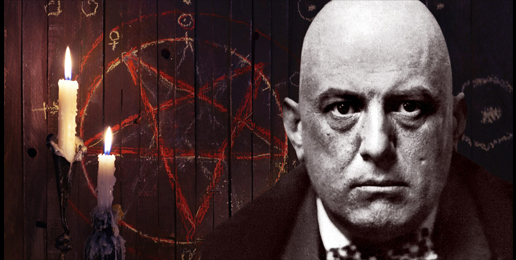
In 2002, the British Broadcasting Corporation polled its viewers for the names of those they believed were the greatest Britons of all time. The BBC compiled the feedback and came up with a list of the top 100 greatest men and women in all British history. One of the names on that list, at number 73, was Aleister Crowley.
Crowley polled ahead of Robert the Bruce, J.K. Rowling, Chaucer, Henry II, J.R.R. Tolkien, Sir Walter Raleigh, and Richard Burton, among others. So, who is Aleister Crowley and why should we care?
There is no doubt Crowley had a significant impact on Great Briton, even the world. It is difficult to see, though, how anyone could view the impact he had as being great.
Crowley was born in 1875 to a wealthy English family. His father, an evangelist, raised Crowley as a Christian. If his father had not died when Crowley was 11, things might have turned out differently for Alister. Following his father’s death, Crowley became unmanageable for his mother. He began questioning Christian teachings and he completely turned away from his early moral upbringing. He started challenging his teachers, took up smoking and began to frequent prostitutes. He became so unruly his mother called him “the Beast,” a nickname he proudly retained for his whole life. After having a child, he insisted that his daughter call him by that name, and she did.
Crowley’s parents had named him Edward Alexander Crowley, but at 20 he changed it to Aleister since he loathed the nickname, Alec (in his biography Crowley spelled it Alick), that his mother called him.
While Crowley attended Cambridge University he engaged in torrid sexual relations with both men and women, was introduced to the occult through an organization called the Golden Dawn and became captivated by the practices. And he became involved with magic and with the ritual use of drugs.
Crowley later became disillusioned with Golden Dawn because the leadership found him to be too hedonistic. After graduating, Crowley travelled the world. He climbed mountains in Mexico and later in India. While in India he developed an interest in yoga and meditation.
After two years abroad, Crowley returned to Europe, to Paris, where he joined a friend from Cambridge, Gerard Kelly, who eventually became a famous painter. During his time in Paris, Crowley met and fell in love with Kelly’s younger sister, Rose. He married her initially to save her from an arranged marriage she did not want, but later they fell in love with each other.
Rose enthusiastically shared Aleister’s beliefs and bizarre sexual preferences. They traveled together and she helped create and develop Crowley’s new Religion, Thelema, which had been partially inspired by Golden Dawn. They wound up having two daughters, one of whom died of typhoid. Apparently because of grief from this loss, Rose started drinking heavily. A few years later, Crowley and Rose divorced and by 1911, Rose was institutionalized.
Crowley continued to develop his religion.
Around 1920 Crowley and several followers traveled to Sicily and set up his Abby of Thelema at Cefalu. He and his acolytes remained at the Abby engaging in their depraved sexual and occult practices until Benito Mussolini caught wind of what they were doing. Mussolini was so disgusted he ordered Crowley and his followers all deported.
After travelling in North Africa for a time, Crowley eventually returned to England where he concentrated on writing. In his books and articles he promoted the occult, sexual excess and sexual liberation, and a no limits anything goes lifestyle. Crowley believed in and engaged in unfettered sex with same and opposite sex partners, even with children and teens. His followers followed suit.
It was about this time that the British press labeled Crowley the “wickedest man in the world.” That’s pretty bad considering all the evil going on in the early 20th century—the rise of organized crime, the emergence of Fascism, the slaughter of the Russian Revolution . . . the horrors perpetrated by the architects of World War I.
Undaunted, Crowley continued to promote his religion, Thelema, and pleasure seeking lifestyles that recognized none of the boundaries of civilized society. His followers were encouraged to do whatever they wanted which was the first principle of Thelema: “’Do What Thou Wilt’ is the whole of the law.” The original list of foundational obligations for Thelemites were:
- To discover and express one’s own Will.
- To abstain from knowingly restricting others from discovering and expressing their own Will.
- To attempt to eliminate those forces that restrict the discovery and expression of Will (i.e. Tyranny, Superstition, and Oppression).
There are dozens of Thelemic orders throughout the United States and Europe today. “Do What Thou Wilt” remains the first principle, but over the years the original “obligations” have been expanded and clarified as follows:
- Each individual has a Will (or ‘True Will’ to distinguish it from one’s wants, wishes, and desires), their purpose on Earth, a Nature to fulfill, and each person’s sole right and duty is to find that Will and to do it.
- Each individual is Divine, the center of their own universe. This is one central meaning of the phrase ‘Every man and every woman is a star.’
- Each individual therefore has their own unique Way in the world, with their own unique ‘good’ and ‘bad’ suitable to their Nature.
- Each individual has the right to be who they are, especially in terms of sexual and gender identity. There is no ‘preferred’ gender identity in Thelema except the one that is the best fulfillment of your nature. As it is said, ‘Take your fill and will of love as ye will, when, where and with whom ye will?’
- Thelemites engage in various spiritual practices, often those of Magick (sic) and Yoga, to try to deepen their understanding of their true nature and Will.
Prominent people took an interest in Crowley in increasing numbers after he died at age 72 in 1947. One of his admirers was Alfred Kinsey. After publishing his two earth changing books, “Sexual Behavior in the Human Male,” and “Sexual Behavior in the Human Female,” Kinsey traveled to Crowley’s home, to locations of the orders of Thelema, and to the Abby of Thelema in Sicily. He was looking for original material on the sexual practices Crowley engaged in, especially for Crowley’s diaries on sex magic. Kinsey was unsuccessful.
Others, too, became enamored with Crowley’s teaching. The Beatles included a photo of Aleister Crowley on the cover of their album, “Sgt. Pepper’s Lonely Hearts Club Band,” and John Lennon said the Beatle’s philosophy was the same as Crowley’s, asserting “[t]he whole Beatle idea was to do what you want, right? To take your own responsibility.” David Bowie, wrote Crowley into his song, Quicksand,
“I’m closer to the Golden Dawn, Immersed in Crowley’s uniform, I’m not a prophet or a stone age man, Just a mortal with potential of a superman”
Jimmy Page of Led Zeppelin bought Crowley’s former home in Scotland, and Timothy Leary was inspired by Crowley when he encouraged his 60’s followers to “turn on, tune in, and drop out.” Leary believed he was carrying on what Crowley started.
Even Jack Parsons, a rocket scientist who founded NASA’s Jet Propulsion Lab was a devoted follower of Crowley. So it was not just members of the counter-culture who were enamored with Crowley’s vision of a hedonistic lifestyle.
Many of Crowley’s books remain available on Amazon today. And his philosophy has become infused throughout Western culture.
Does this make him a great man? There is no objective measure by which he could be considered great. Yet he has had a profound influence on us, starting with the counter-culture of the 60’s and 70’s and extending right into the 21st century. The occult, the new age religion, the bondage to pleasure, the desire to ever expanding sexual boundaries, his shadow envelopes it all.
No. He was not great. Evil is the more appropriate term.
But what does this say about us? How can a man go from being considered the wickedest man on earth, someone so depraved Mussolini couldn’t allow him to remain in Italy, to being considered one of the greatest men in the history of Great Briton, a nation whose empire once spanned the entire globe? How did this happen?
Darkness is now viewed as light. Evil is now seen as good.
Where is the church?






















